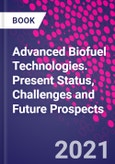Advanced Biofuel Technologies: Present Status, Challenges and Future Prospects deals with important issues such as feed stock availability, technology options, greenhouse gas reduction as seen by life cycle assessment studies, regulations and policies. This book provides readers complete information on the current state of developments in both thermochemical and biochemical processes for advanced biofuels production for the purpose of transportation, domestic and industrial applications. Chapters explore technological innovations in advanced biofuels produced from agricultural residues, algae, lipids and waste industrial gases to produce road transport fuels, biojet fuel and biogas.
Please Note: This is an On Demand product, delivery may take up to 11 working days after payment has been received.
Table of Contents
1. An overview of some futurist advanced biofuels and their conversion technologies2. Advanced Biofuels: Perspectives and Possibilities
3. Biomass Feedstocks for Advanced Biofuels: Sustainability and Supply Chain Management
4. Microalgal Biofuels Challenges, Status and Scope
5. Biodiesel and green diesel
6. Development of 2nd generation ethanol technologies in India: Current status of commercialization
7. Biomass characterisation
8. Pretreatment of lignocellulosic biomass for bioethanol production
9. Recent developments in cellulolytic enzymes for ethanol production
10. Yeast mediated ethanol fermentation from lignocellulosic pentosan
11. Pyrolytic bio oil- production and applications
12. Biomass gasification Thermo-chemical route to energetic bio-chemicals
13. Progress and Trends in Renewable Jet Fuels
14. Recent advances in lignin valorisation
15. Bio-waste to hydrogen production technologies
16. Biorefinery approach for production of some high value chemicals
17. Biofuels and bioproducts from seaweeds
18. Anaerobic Gas Fermentation: A Carbon Refining Process for the Production of Sustainable Fuels, Chemicals, and Food
19. Cyanobacteria: a source of biofuel production and platform chemicals
20. Current Technical Advancement in Biogas Production and Indian Status
21. Regulations and specifications for biofuels
22. Life cycle and techno-economic assessment of microalgal biofuels
Authors
Deepak K. Tuli Bio-Energy Research Centre; IOC (R&D), Faridabad 121007, India. Dr. D.K. Tuli earned his PhD in synthetic organic chemistry in 1977 and did his post-doctoral research at the University of Liverpool in 1978-81 and was a SERC senior research fellow at Robert Robinson labs, UK, from 1986-88. He supervised as Executive Director of the Indian Oil Corporation, Research and Development centre, Faridabad, India. He headed alternative energy R&D in IOC comprising areas of biofuels and bio-energy and solar energy for 12 years and has 14 US patents, 2 European patents, 24 Indian patents and 88 research publications. His major area of research interest is bioenergy, LCA, technology scale up and additives for fuels. For five years he headed the DBT-IOC Centre for Advanced Bio-Energy Research and was DBT Bioenergy Chair for three years. He has been an adjunct Professor at two Australian universities. Dr Tuli co-edited an Elsevier book in 2020 on microbial cellulases. Sangita Kasture Department of Biotechnology, Ministry of Science and Technology, Government of India (New Delhi), India. Dr. Sangita M. Kasture (Bodhankar) is senior scientist and associate head of the Department of Biotechnology, Ministry of Science and Technology, Government of India. Dr. Sangita has been associated with the Department of Biotechnology (DBT), Ministry of Science and Technology, Government of India, for the last 10 years. She has been promoting innovations in Bioenergy, Environment Biotechnology, and Secondary Agriculture through various R&D schemes for the Government of India. Her dedicated involvement has significantly contributed to accelerating innovations in the country's clean energy sector. Her vision and contributions have been significant in shaping up Waste-to-Energy R&D strategies and policies in India.She is the country focal point for multilateral programs like Mission Innovation, India, Biofuture Platform and bilateral R&D collaborations with Canada, Denmark, and the Netherlands. As a member of the Indian delegation, she visited several countries including the USA, UK, China, Sweden, Denmark, Canada, Brazil, Europe, Chile and more, to strongly represent India at various international platforms and meetings. Dr. Sangita has played a crucial role in setting up Centres of Excellence and Fellowship schemes to create state-of-the-art infrastructure and capacity building in the clean energy area. She has been instrumental in setting up an International Incubation Centre in Clean Energy to provide suitable ecosystems to innovators and start-ups at the early stage of innovation. She is a member of various Scientific Advisory Committees and Governing Councils constituted by the Department of Biotechnology, GOI.
She obtained industrial experience from two leading Indian Biotech companies and Post Doctorate research experience from Lund University (Sweden) and Polish Academy of Sciences (Poland). Her areas of research are bio-separations, enzyme catalysis, green chemistry, and downstream processing of biomolecules. Arindam Kuila Department of Bioscience & Biotechnology, Banasthali Vidyapith, Rajasthan, India. Dr. Arindam Kuila is currently working as Assistant Professor at the Department of Bioscience & Biotechnology, Banasthali Vidyapith (Deemed University), Rajasthan. Previously, he worked as a research associate at Hindustan Petroleum Green R&D Centre, Bangalore. He did his PhD from Agricultural & Food Engineering Department, Indian Institute of Technology Kharagpur in 2013 in the area of lignocellulosic biofuel production. His major areas of research are enzyme technology, bioprocess development for biofuel production and biopolymer production from lignocellulosic biomass. He has one Indo-Brazil collaborative project funded by DBT, New Delhi. He has guided 2 PhD students and currently 4 PhD students are working under his guidance. He has published 7 edited books, 8 book chapters, 28 papers in peer reviewed Journals and filled 5 patents. He is currently acting as guest editor for the Journal of Food Process Engineering (Wiley, Impact Factor: 2.356) and Biomass Conversion and Biorefinery Joournal (Springer, Impact Factor: 4.987).








